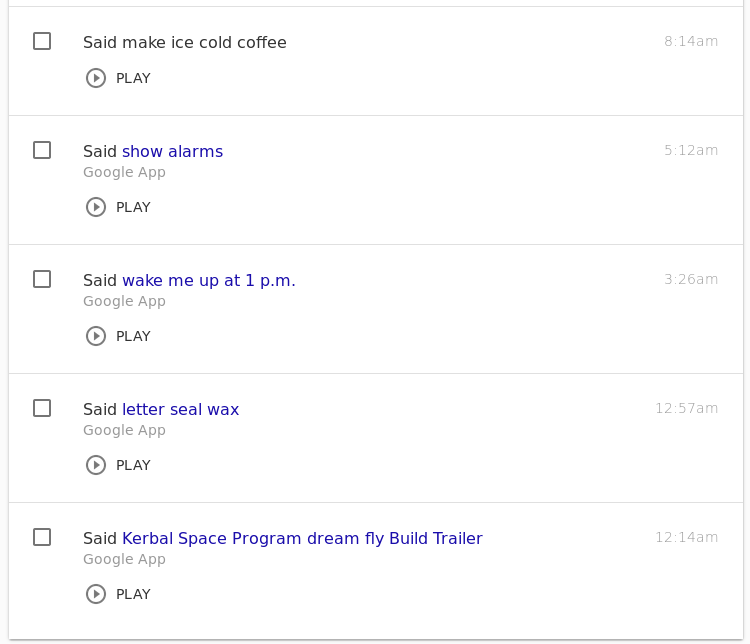It seems that Google makes audio recordings of the microphones all the time despite attempts to minimize the situation. The "hotword" search - when you start a search by saying "Ok Google" - was criticized before, when it was downloaded open-source browsers running Chrome. However, major concerns for privacy that Google still does not start recording when you say "Ok Google"; it was recording before you said the hotword.
Back when Google drive-by-downloaded a black box with a registration code to the Chrome open source browser, there was a public outcry on the Google code in your listening room. The objections mainly fell into one of two categories:
- Google downloads a black box code for open-source systems and free software without authorization, compromising
- Google East. using proprietary code to listen to your room
Of these, the first was considered most serious by far, as any code will have access to exclusive operation device sensors -. including microphone - almost by definition, so it was not really considered strange that the owner code had access to black box recording. However, there was still a problem of privacy and a concern that Google had the ability to listen to any and every room where there was a Chrome or running Android, which - frankly - is a fairly large portion of available rooms on the planet .
However, Google roundabout sort of apologized for drive-by-download black-box proprietary code to open source Chromium browser, and people trying to shoot down the story (there always those, and usually with the top voted comment ...) insisted that Google has not opened until audio after you said the magic words "Ok Google ", something that is called a hotword to start recording, analysis and transcription.
As part of the transparency of the Google initiative, you can see (some?) Google data stored on you. It is that all audio searches are stored permanently, and you can listen to your own previous voice commands and voice search. They are listed in chronological order.

A screenshot of my Google Audio History. I can listen to recordings and read transcripts. If you use Voice Search, you have a page like this, too.
You will recall the discussion of the previous privacy, Google access to microphones in almost every room gives Google the ability to spy on each room and all the time. It should be emphasized that this is a technical capacity; there is no indication this is happening, but the presence of capacity is causing serious privacy issues
In this discussion, people said -. no, insisted and shouted - that fear was exaggerated, tinfoilhattery and mental. "Obviously, Google only audio after you say Ok, Google ," the experts said in all directions. But listen to this audio recorded off the search history page audio search from Google, something sticks out clean, nobody seems to have noticed. Listen to this:
Have you heard? Registration starts with me by saying "Ok Google." This means that the above statement - that the recording starts after these words are spoken - is incorrect. The recording happened before these words were spoken. And if the record came before these words were said, that should be the case, as they are part of the same record, and microphone audio recording (s) is always activates an unknown degree. We see what Google claims is sent to Google - but of course we have no way of verifying this other than blind faith, which is a company whose motto has evolved over the years from "Do not be evil ", to" Privacy is overrated, "to" Whee, we make military robots. "
But here's the thing. Although Google did not intentionally recording unknown signals in addition HOTWORD research - and I can not stress enough that there is no way of knowing, but blind faith is needed - Google yet begin recording audio at random times and send it to Google's servers, when he picks something he thinks sounds like "Ok, Google" from a conversation. What happened to me there is a week in Seoul, when I was chatting with privacy activists EFF Parker Higgins and Maira Sutton (at least I think it was a part of the conversation, but is beside the point here). Suddenly, I noticed that my phone transcribed what I said on the screen: the audio detection Google began in mid-conversation and it was the recording of the piece. I can download this part of my conversation with the EFF activists outside History Google Voice page below:
So in summary,
We now know that Google's audio recording does not start after you say "Ok Google", but was active before you l have said, suggesting that it is still active to some extent.
Regardless of intentions, Google can begin recording audio from a room mid-conversation anyway, as shown above.
This has all sorts of implications for privacy wicked, and they are not easy to solve. How to do it right to privacy is to ensure that any audio interpretation should occur locally, but even then you can not know if anything is sent to a remote server if you are looking for bad things as long as the owner code is running (for example, if you are looking for something as methods of acquiring the substances used to manufacture thermonuclear weapons, a search which I dare say is never used to actually make a in your basement, but could still raise a flag somewhere).
Privacy remains your own responsibility.

0 Komentar